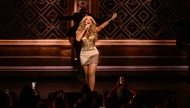
Year of the Goose By Carly Hallman, $16.
“Greatness resides outside the body,” Carly Hallman’s characters tell us in her raucous new novel, Year of the Goose. “It does not belong to any man or woman. It is something we borrow, something that calls to be shared.”
Hallman’s novel is pure fantasy, a mashup of disparate souls trying to capture greatness for a moment. Goosefloats from one tale to another as we follow the ascent of Kelly Hui, privileged daughter of a Chinese snack-food CEO; Kelly is willing to trample anyone in her path. Hallman uses her signature wit to trace tales of greed and gluttony from a fat camp to a hair-extension farm, and includes a long section narrated by a turtle. This zany novel of upward mobility gets to the heart of obsessions with having and consuming.
Year of the Goose opens at a fat camp for children, and immediately takes a dark turn. Kids slip and fall and die, they fall victim to their insatiable hungers and die, they die at the hands of their careless caregivers. Deaths of fat children in one area mean the government praises a lowering of the obesity rate. Kelly is unfazed by death, and Hallman uses the hilariously macabre opening scene to explore the character’s shady past, back to her teenage years in LA. Year of the Goose is brutally flip with its characters; Hallman understands the tantalizing power of a morbid joke. This novel of “unfathomable possibilities actualized in sequence” is gallows humor for China’s tycoon culture. Hallman sees into it enough to envision its end—or the ends the tycoon society will go to in order to perpetuate its own existence.
“We believe that wealth is both our greatest liberator and our greatest oppressor,” a character narrates toward the end of Goose. “That money is but a clever dictator and a master propagandist, filling our hearts with hope and our minds with fear.” Life in Hallman’s world is hard; death comes more easily than fame or notoriety. Even the goose—the snack company’s anthropomorphic mascot—gets his opportunity to narrate, but doesn’t escape the same dire consequences as the human characters. This is a world where you can die for being hungry, but to live is to consume morbidly. Hallman’s work employs artful paradoxes stacked atop each other like perfect snack cakes, and happens upon some touching realizations about how children don’t choose their own lives. In this insane romp through the author’s imagination, nobody emerges unscathed.







